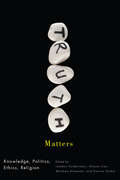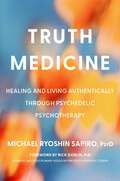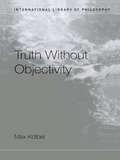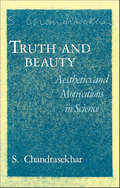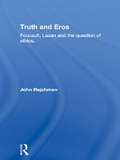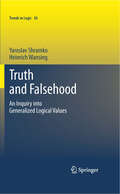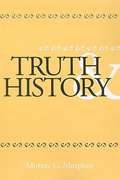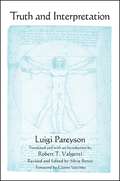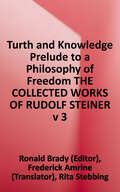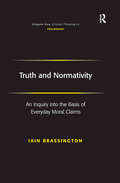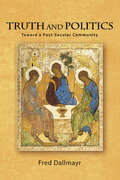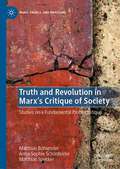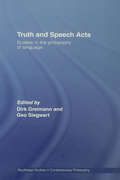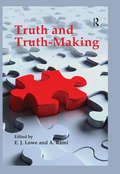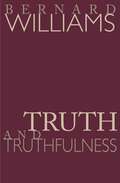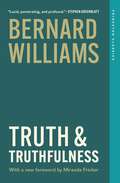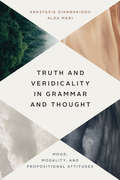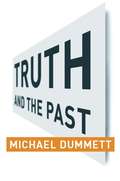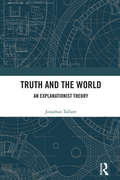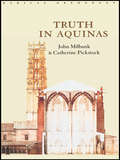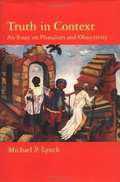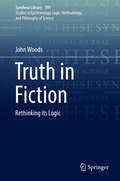- Table View
- List View
Truth Matters: Knowledge, Politics, Ethics, Religion
by Lambert Zuidervaart Allyson Carr Ronnie Shuker Matthew J. KlaassenWhy should we seek and tell the truth? Does anyone know what truth is? Many are skeptical about the relevance of truth. Truth Matters endeavours to show why truth is important in a world where the very idea of truth is contested. Putting philosophers in conversation with educators, literary scholars, physicists, political theorists, and theologians, Truth Matters ranges across both analytic and continental philosophy and draws on the ideas of thinkers such as Aquinas, Balthasar, Brandom, Davidson, Dooyeweerd, Gadamer, Habermas, Kierkegaard, Plantinga, Ricoeur, and Wolterstorff. Some essays attempt to provide a systematic account of truth, while others wrestle with the question of how truth is told and what it means to live truthfully. Contributors address debates between realists and anti-realists, explore issues surrounding relativism and constructivism in education and the social sciences, examine the politics of truth telling and the ethics of authenticity, and consider various religious perspectives on truth. Most scholars agree that truth is propositional, being expressed in statements that are subject to proof or disproof. This book goes a step farther: yes, propositional truth is important, but truth is more than propositional. To recognize how it is more than propositional is crucial for understanding why truth truly matters. Contributors include Doug Blomberg (ICS), Allyson Carr (ICS), Jeffrey Dudiak (King’s University College), Olaf Ellefson (York University), Gerrit Glas (VU University Amsterdam), Gill K. Goulding (Regis College), Jay Gupta (Mills College), Clarence Joldersma (Calvin College), Matthew J. Klaassen (ICS), John Jung Park (Duke University), Pamela J. Reeve (St. Augustine’s Seminary), Amy Richards (World Affairs Council of Western Michigan), Calvin Seerveld (ICS), Ronnie Shuker (ICS), Adam Smith (Brandeis University), John Van Rys (Redeemer University College), Darren Walhof (Grand Valley State University), Matthew Walhout (Calvin College), and Lambert Zuidervaart (ICS).
Truth Medicine: Healing and Living Authentically Through Psychedelic Psychotherapy
by Michael Ryoshin SapiroAn accessible guide to psychedelic psychotherapy and its transformative healing abilities, by a clinical psychologist and psychedelics expert.Are you living the life you&’re meant to be living, or fulfilling somebody else&’s ideas of who you should be? Would you like to learn what&’s true for you underneath the programming while healing old wounds that keep you living in cycles of trauma, depression, and anxiety? Truth Medicine explains why we often feel stuck and are unable to move forward into a life of thriving, and how psychedelic psychotherapy addresses these essential questions for our well-being. Grounded in research and experience, Truth Medicine answers frequently asked questions about psychedelic psychotherapy—what it is and how it works, and what medicines are used (primarily ketamine, with an overview of other medicines on the horizon, such as MDMA and psilocybin), contraindications, and more. Walking readers through the whole process from preparation through medicine sessions and into integration, Dr. Sapiro also shares case studies that are inspiring, engaging, and raw, for a go-to guide for anyone looking to heal. While Truth Medicine describes in detail how psychedelic psychotherapy works to bring about healing and growth, it ultimately points you back inside yourself, where your own wisdom and truth are waiting to be discovered and lived.
Truth Speaks to Power
by Walter BrueggemannWorld-renowned biblical interpreter Walter Brueggemann invites readers to take a closer look at the subversive messages found within the Old Testament. Brueggemann asserts that the Bible presents a "sustained contestation" over truth, in which established institutions of power do not always prevail. But this is not always obvious at first glance. A closer look reveals that the text actually contradicts the apparent meaning of an innocent, face-value reading. Brueggemann invites the reader into this thick complexity of the textual reading, where the authority of power is undermined in cunning and compelling ways. He insists that we are--as readers and interpreters--always contestants for truth, whether we recognize ourselves as such or not.
Truth Without Objectivity (International Library of Philosophy)
by Max KölbelTruth without Objectivity provides a critique of the mainstream view of 'meaning'. Kölbel examines the standard solutions to the conflict implicit in this view, demonstrating their inadequacy and developing instead his own relativist theory of truth.The mainstream view of meaning assumes that understanding a sentence's meaning implies knowledge of the conditions required for it to be true. This view is challenged by taste judgements, which have meaning, but seem to be neither true nor false.
Truth and Beauty: Aesthetics and Motivations in Science
by S. Chandrasekhar"What a splendid book! Reading it is a joy, and for me, at least, continuing reading it became compulsive. . . . Chandrasekhar is a distinguished astrophysicist and every one of the lectures bears the hallmark of all his work: precision, thoroughness, lucidity. "—Sir Hermann Bondi, Nature The late S. Chandrasekhar was best known for his discovery of the upper limit to the mass of a white dwarf star, for which he received the Nobel Prize in Physics in 1983. He was the author of many books, including The Mathematical Theory of Black Holes and, most recently, Newton's Principia for the Common Reader.
Truth and Beauty: Aesthetics and Motivations in Science
by S. ChandrasekharSeven lectures detailing the author&’s thoughts on motivations in the pursuit of science and patterns of scientific creativity.&“What a splendid book! Reading it is a joy, and for me, at least, continuing reading it became compulsive…. Chandrasekhar is a distinguished astrophysicist and every one of the lectures bears the hallmark of all his work: precision, thoroughness, lucidity.&” —Sir Hermann Bondi, Nature Does aesthetics play a role in science? Can it be that science is given impetus by a search for beauty? What relation exists between the beauty of an idea and its power to account for some aspect of the natural world? Throughout his distinguished career, S. Chandrasekhar has given time and thought to these questions and to their implications for his work and the work of others. Truth and Beauty gathers the fruits of his meditations. Heisenberg, observes Chandrasekhar, spoke eloquently of the sheer force of his aesthetic experience when he discovered the key to the quantum theory. Weyl characterized the process of working out his gauge theory as a choice of the beautiful over the true, a choice strongly supported by subsequent research. Einstein also felt the aesthetic power underlying his discoveries. While most of the seven essays in Truth and Beauty deal generally with the nature of science and the process of research, two essays explore the work of individuals. —Edward Arthur Milne and Arthur Stanley Eddington The late S. Chandrasekhar was best known for his discovery of the upper limit to the mass of a white dwarf star, for which he received the Nobel Prize in Physics in 1983. He was the author of many books, including The Mathematical Theory of Black Holes and, most recently, Newton's Principia for the Common Reader.
Truth and Eros: Foucault, Lacan and the question of ethics. (Routledge Library Editions: Michel Foucault)
by John RajchmanIn this reissused work, first published in 1991, John Rajchman isolates the question of ethics in the work of Foucault and Lacan and explores its ramifications and implications for the present day. He demonstrates that the question of ethics was at once the most difficult and the most intimate question for these two authors, offering a complex point of intersection between them. As such, he argues that it belongs to the great tradition that is concerned with the passion or eros of philosophy and of its "will to truth". Truth and Eros suggests a way of reading Foucault and Lacan as philosophers who re-eroticised the activity of thought in our time, opeing new and different spaces for thought and action - new types of subjectivity.
Truth and Falsehood
by Heinrich Wansing Yaroslav ShramkoThe book presents a thoroughly elaborated logical theory of generalized truth-values understood as subsets of some established set of (basic) truth values. After elucidating the importance of the very notion of a truth value in logic and philosophy, we examine some possible ways of generalizing this notion. The useful four-valued logic of first-degree entailment by Nuel Belnap and the notion of a bilattice (a lattice of truth values with two ordering relations) constitute the basis for further generalizations. By doing so we elaborate the idea of a multilattice, and most notably, a trilattice of truth values - a specific algebraic structure with information ordering and two distinct logical orderings, one for truth and another for falsity. Each logical order not only induces its own logical vocabulary, but determines also its own entailment relation. We consider both semantic and syntactic ways of formalizing these relations and construct various logical calculi.
Truth and History
by Murray G. MurpheyHe examines the evidence on which historical theories are based, the types of explanations used, and particularly the way historical theories are tested. The book treats not only the actual process of historical research but also the philosophical problems involved in historical work. The treatment of causation is new, as is the discussion of epistemology. In his discussions, Murphey covers a wide range of sources and examples, including Frederick Jackson Turner, the Gospels, perspectives on the causes of the Great Depression, the Vinland Map, witchcraft, and material culture. The book is addressed to all who do history or write about it, and it will be a useful text for those who teach courses in historiography.
Truth and Interpretation (SUNY series in Contemporary Italian Philosophy)
by Luigi PareysonLuigi Pareyson (1918–1991) was one of the most important Italian philosophers to emerge after World War II and stands shoulder to shoulder with fellow hermeneutic thinkers Hans-Georg Gadamer and Paul Ricoeur. The product of a well-developed theory of interpretation that stretches back to the late 1940s, his 1971 masterpiece Truth and Interpretation provides the historical impetus and theoretical framework for the questions of existence, art, and politics that would motivate his most famous students, Umberto Eco and Gianni Vattimo. In a time when the meaning of truth as an interpretation is challenged by the chaotic din of media on the one side and the violent force of absolute claims from science, religion, and political economy on the other, Pareyson's meditation on the value of thinking that is shaped by the traditions of philosophy and yet responds to contemporary demands remains timely and pressing more than forty years after its initial publication.
Truth and Knowledge: Prelude to a Philosophy of Freedom
by Rudolf SteinerThis third volume of Rudolf Steiner's Collected Works was originally his doctoral dissertation. Terse and to the point, it truly is a prelude to his later Philosophy of Freedom - indeed, one can sense an excitement of discovery that is absent in the latter work. This translation has been thoroughly reworked to make it conform to the late Ronald Brady's masterful introduction, which provides a line-by-line commentary.
Truth and Method
by Hans Georg GadamerA study and investigation that deals with the problem of hermeneutics--- the understanding and interpretation of the Bible and other literary texts arguing that the phenomenon is not a human science or method but the human experience of the world.
Truth and Normativity: An Inquiry into the Basis of Everyday Moral Claims (Ashgate New Critical Thinking in Philosophy)
by Iain BrassingtonBeginning by posing the question of what it is that marks the difference between something like terrorism and something like civil society, Brassington argues that commonsense moral arguments against terrorism or political violence tend to imply that the modern democratic polis might also be morally unjustifiable. At the same time, the commonsense arguments in favour of something like a modern democratic polis could be co-opted by the politically violent as exculpatory. In exploring this prima facie problem and in the course of trying to substantiate the commonsense distinction, Brassington identifies a tension between the primary values of truth and normativity in the standard accounts of moral theory which he ultimately resolves by adopting lines of thought suggested by Martin Heidegger and concluding that the problem with mainstream moral philosophy is that, in a sense, it tries too hard.
Truth and Politics: Toward a Post-Secular Community
by Fred DallmayrOppositions found in nearly every element of society readily give way to antagonism and hostility and, ultimately, to war and destruction. Both historically and analytically, this condition can be traced to an outlook called "the modern paradigm," launched by Descartes' "cogito ergo sum." The paradigm shift explored in this study is proposed on three levels: faith, society, and ecology. On the faith (human-divine relations) level, Fred Dallmayr suggests a shift where faith and world are seen in symbiosis rather than set against each other in the dualism that modernity has caused. On the societal (inter-human relations) level, he suggests a shift that would repair modernity's trend of sundering individuals from any communal background, which has caused people to increasingly act (solely) in their own interests. On the ecology (man-nature relations) level, Dallmayr explores how nature has responded to human exploitation and constant intervention, underscoring the need for a paradigm shift here as well. Truth and Politics seeks to remedy the "underside" of modernity and thus to inaugurate a "postmodern" (not anti-modern") and "post-secular" (not anti-secular) perspective.
Truth and Revolution in Marx's Critique of Society: Studies on a Fundamental Problematique (Marx, Engels, and Marxisms)
by Matthias Bohlender Anna-Sophie Schönfelder Matthias SpekkerThis book deals with a central aspect of Marx’s critique of society that is usually not examined further since it is taken as a matter of course: its scientific claim of being true. But what concept of truth underlies his way of reasoning which attempts to comprehend the social and political circumstances in terms of the possibility of their practical upheaval? In three studies focusing specifically on the development of Marx’s scientific critique of capitalist society, his journalistic commentaries on European politics, and his reflections on the organisation of revolutionary subjectivity, the authors carve out the immanent relation between the scientifically substantiated claim to truth and the revolutionary perspective in Marxʼs writings. They argue that Marx does not grasp the world ‘as it is’ but conceives it as an inverted state which cannot remain what it is but generates the means by which it can eventually be overcome. This is not something to be taken lightly: Such a concept has theoretical, political and even violent consequences—consequences that nevertheless derive neither from a subjective error nor a contamination of an otherwise ‘pure’ science. By analyzing Marx’s concept of truth the authors also attempt to shed light on a pivotal problematique of any modern critique of society that raises a reasoned claim of being true.
Truth and Speech Acts: Studies in the Philosophy of Language (Routledge Studies in Contemporary Philosophy)
by Dirk Greimann Geo SiegwartWhereas the relationship between truth and propositional content has already been intensively investigated, there are only very few studies devoted to the task of illuminating the relationship between truth and illocutionary acts. This book fills that gap. This innovative collection addresses such themes as: the relation between the concept of truth and the success conditions of assertions and kindred speech acts the linguistic devices of expressing the truth of a proposition the relation between predication and truth.
Truth and Truth-making
by E. J. Lowe A. RamiTruth depends in some sense on reality. But it is a rather delicate matter to spell this intuition out in a plausible and precise way. According to the theory of truth-making this intuition implies that either every truth or at least every truth of a certain class of truths has a so-called truth-maker, an entity whose existence accounts for truth. This book aims to provide several ways of assessing the correctness of this controversial claim. This book presents a detailed introduction to the theory of truth-making, which outlines truth-maker relations, the ontological category of truth-making entities, and the scope of a truth-maker theory. The essays brought together here represent the most important articles on truth-making in the last three decades as well as new essays by leading researchers in the field of the theory of truth and of truth-making.
Truth and Truthfulness: An Essay in Genealogy
by Bernard WilliamsWhat does it mean to be truthful? What role does truth play in our lives? What do we lose if we reject truthfulness? No philosopher is better suited to answer these questions than Bernard Williams. Writing with his characteristic combination of passion and elegant simplicity, he explores the value of truth and finds it to be both less and more than we might imagine. Modern culture exhibits two attitudes toward truth: suspicion of being deceived (no one wants to be fooled) and skepticism that objective truth exists at all (no one wants to be naive). This tension between a demand for truthfulness and the doubt that there is any truth to be found is not an abstract paradox. It has political consequences and signals a danger that our intellectual activities, particularly in the humanities, may tear themselves to pieces. Williams's approach, in the tradition of Nietzsche's genealogy, blends philosophy, history, and a fictional account of how the human concern with truth might have arisen. Without denying that we should worry about the contingency of much that we take for granted, he defends truth as an intellectual objective and a cultural value. He identifies two basic virtues of truth, Accuracy and Sincerity, the first of which aims at finding out the truth and the second at telling it. He describes different psychological and social forms that these virtues have taken and asks what ideas can make best sense of them today. Truth and Truthfulness presents a powerful challenge to the fashionable belief that truth has no value, but equally to the traditional faith that its value guarantees itself. Bernard Williams shows us that when we lose a sense of the value of truth, we lose a lot both politically and personally, and may well lose everything.
Truth and Truthfulness: An Essay in Genealogy (Princeton Classics)
by Bernard WilliamsWhat does it mean to be truthful? What role does truth play in our lives? What do we lose if we reject truthfulness? No philosopher is better suited to answer these questions than Bernard Williams. Writing with his characteristic combination of passion and elegant simplicity, he explores the value of truth and finds it to be both less and more than we might imagine.Modern culture exhibits two attitudes toward truth: suspicion of being deceived (no one wants to be fooled) and skepticism that objective truth exists at all (no one wants to be naive). This tension between a demand for truthfulness and the doubt that there is any truth to be found is not an abstract paradox. It has political consequences and signals a danger that our intellectual activities, particularly in the humanities, may tear themselves to pieces.Williams's approach, in the tradition of Nietzsche's genealogy, blends philosophy, history, and a fictional account of how the human concern with truth might have arisen. Without denying that we should worry about the contingency of much that we take for granted, he defends truth as an intellectual objective and a cultural value. He identifies two basic virtues of truth, Accuracy and Sincerity, the first of which aims at finding out the truth and the second at telling it. He describes different psychological and social forms that these virtues have taken and asks what ideas can make best sense of them today.Truth and Truthfulness presents a powerful challenge to the fashionable belief that truth has no value, but equally to the traditional faith that its value guarantees itself. Bernard Williams shows us that when we lose a sense of the value of truth, we lose a lot both politically and personally, and may well lose everything.
Truth and Veridicality in Grammar and Thought: Mood, Modality, and Propositional Attitudes
by Anastasia Giannakidou Alda Mari PhDCan language directly access what is true, or is the truth judgment affected by the subjective, perhaps even solipsistic, constructs of reality built by the speakers of that language? The construction of such subjective representations is known as veridicality, and in this book Anastasia Giannakidou and Alda Mari deftly address the interaction between truth and veridicality in the grammatical phenomena of mood choice: the indicative and subjunctive choice in the complements of modal expressions and propositional attitude verbs.Combining several strands of analysis—formal linguistic semantics, syntactic theory, modal logic, and philosophy of language—Giannakidou and Mari’s theory not only enriches the analysis of linguistic modality, but also offers a unified perspective of modals and propositional attitudes. Their synthesis covers mood, modality, and attitude verbs in Greek and Romance languages, while also offering broader applications for languages lacking systematic mood distinction, such as English. Truth and Veridicality in Grammar and Thought promises to shape longstanding conversations in formal semantics, pragmatics, and philosophy of language, among other areas of linguistics.
Truth and the Past (Columbia Themes in Philosophy)
by Michael DummettMichael Dummett's three John Dewey Lectures—"The Concept of Truth," "Statements About the Past," and "The Metaphysics of Time"—were delivered at Columbia University in the spring of 2002. Revised and expanded, the lectures are presented here along with two new essays by Dummett, "Truth: Deniers and Defenders" and "The Indispensability of the Concept of Truth."In Truth and the Past, Dummett clarifies his current positions on the metaphysical issue of realism and the philosophy of language. He is best known as a proponent of antirealism, which loosely characterizes truth as what we are capable of knowing. The events of the past and statements about them are critical tests of an antirealist position. These essays continue and significantly contribute to Dummett's work.
Truth and the World: An Explanationist Theory
by Jonathan TallantHow do we explain the truth of true propositions? Truthmaker theory is the branch of metaphysics that explores the relationships between what is true and what exists. It plays an important role in contemporary debates about the nature of metaphysics and metaphysical enquiry. In this book Jonathan Tallant argues, controversially, that we should reject truthmaker theory. In its place he argues for an 'explanationist' approach. Drawing on a deflationary theory of truth he shows that it allows us to explain the truth of true propositions and respond to recent arguments that purport to show otherwise. He augments this with a distinction between internally and externally quantified claims: externally quantified claims are claims that quantify over elements of our ontology that play an indispensable explanatory role; internally quantified claims do not. He deploys this union of deflationism and a distinction between kinds of quantification to pursue metaphysical inquiry, sketching the implications for a number of first-order debates, including those in the philosophy of time, modality and mathematics, and also shows how this explanationist model can be used to solve the key problems that afflicted truthmaker theory. Truth and the World is an important contribution to debates about truth and truthmaker theory as well as metametaphysics, the metaphysics of time and the metaphysics of mathematics, and is essential reading for students and scholars engaged in the study of these topics.
Truth in Aquinas (Routledge Radical Orthodoxy)
by John Milbank Catherine PickstockProvocative and sophisticated, Truth in Aquinas is a fascinating re-evaluation of a key area - truth - in the work of Thomas Aquinas. John Milbank and Catherine Pickstock's provocative but strongly argued position is that many of the received views of Aquinas as philosopher and theologian are wrong.This compelling and controversial work builds on the amazing reception of Radical Orthodoxy (Routledge, 1999).
Truth in Context: An Essay on Pluralism and Objectivity
by Michael P. LynchLynch argues that there is a middle path, one where metaphysical pluralism is consistent with a robust realism about truth. Drawing on the work of Hilary Putnam, W. V. O. Quine, and Ludwig Wittgenstein, among others, Lynch develops an original version of metaphysical pluralism.
Truth in Fiction: Rethinking Its Logic (Synthese Library #391)
by John WoodsThis monograph examines truth in fiction by applying the techniques of a naturalized logic of human cognitive practices. The author structures his project around two focal questions. What would it take to write a book about truth in literary discourse with reasonable promise of getting it right? What would it take to write a book about truth in fiction as true to the facts of lived literary experience as objectivity allows?It is argued that the most semantically distinctive feature of the sentences of fiction is that they areunambiguously true and false together. It is true that Sherlock Holmes lived at 221B Baker Street and also concurrently false that he did. A second distinctive feature of fiction is that the reader at large knows of this inconsistency and isn’t in the least cognitively molested by it. Why, it is asked, would this be so? What would explain it?Two answers are developed. According to the no-contradiction thesis, the semantically tangled sentences of fiction are indeed logically inconsistent but not logically contradictory. According to the no-bother thesis, if the inconsistencies of fiction were contradictory, a properly contrived logic for the rational management of inconsistency would explain why readers at large are not thrown off cognitive stride by their embrace of those contradictions. As developed here, the account of fiction suggests the presence of an underlying three - or four-valued dialethic logic. The author shows this to be a mistaken impression. There are only two truth-values in his logic of fiction.The naturalized logic of Truth in Fiction jettisons some of the standard assumptions and analytical tools of contemporary philosophy, chiefly because the neurotypical linguistic and cognitive behaviour of humanity at large is at variance with them. Using the resources of a causal response epistemology in tandem with the naturalized logic, the theory produced here is data-driven, empirically sensitive, and open to a circumspect collaboration with the empirical sciences of language and cognition.
